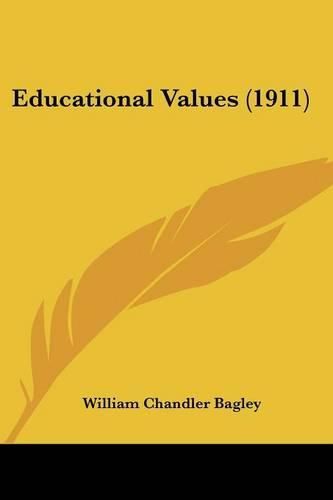Readings Newsletter
Become a Readings Member to make your shopping experience even easier.
Sign in or sign up for free!
You’re not far away from qualifying for FREE standard shipping within Australia
You’ve qualified for FREE standard shipping within Australia
The cart is loading…






Purchase of this book includes free trial access to www.million-books.com where you can read more than a million books for free. This is an OCR edition with typos. Excerpt from book: CHAPTER H The Acquired Controls Of Conduct. (A) Specific Habits 1. The power to rise above the operation of blind instinct, and to control conduct in the light of experience and conscious purpose, is the most significant human prerogative. It is the prime task of education to see to it that the useful modifications of conduct that have been accumulated with the experience of the race are transmitted safely from generation to generation. Physical heredity, so far as is now known, cannot transmit these modifications through the germ cell. As was pointed out in the last chapter, the physical inheritance of modifications would doubtless prove a disadvantage rather than a benefit to man. The shortcomings of physical heredity in this regard place a correspondingly heavy responsibility upon social heredity, and in social heredity, formal education is the important factor. The paramount problem of education becomes, therefore, the conservation of experience; and the materials of education are the controls of conduct which represent the resultants of that experience. Of these controls, not all are worthy of perpetuation. Changing conditions bring changed needs and demand new adjustments.Thus the task of selecting for survival the essential elements of experience is one of the most troublesome constructive problems of the educator. Subsequent chapters will attempt to lay down certain principles that may serve as a guide in this selection; but, as a preliminary to this discussion, it will first be necessary to define and classify the conduct-controls that come out of experience, and which constitute the materials with which education has to deal. 2. The following outline will 1ndicate at a glance the various rubrics of classification that will be followed in the subsequent dis…
$9.00 standard shipping within Australia
FREE standard shipping within Australia for orders over $100.00
Express & International shipping calculated at checkout
Purchase of this book includes free trial access to www.million-books.com where you can read more than a million books for free. This is an OCR edition with typos. Excerpt from book: CHAPTER H The Acquired Controls Of Conduct. (A) Specific Habits 1. The power to rise above the operation of blind instinct, and to control conduct in the light of experience and conscious purpose, is the most significant human prerogative. It is the prime task of education to see to it that the useful modifications of conduct that have been accumulated with the experience of the race are transmitted safely from generation to generation. Physical heredity, so far as is now known, cannot transmit these modifications through the germ cell. As was pointed out in the last chapter, the physical inheritance of modifications would doubtless prove a disadvantage rather than a benefit to man. The shortcomings of physical heredity in this regard place a correspondingly heavy responsibility upon social heredity, and in social heredity, formal education is the important factor. The paramount problem of education becomes, therefore, the conservation of experience; and the materials of education are the controls of conduct which represent the resultants of that experience. Of these controls, not all are worthy of perpetuation. Changing conditions bring changed needs and demand new adjustments.Thus the task of selecting for survival the essential elements of experience is one of the most troublesome constructive problems of the educator. Subsequent chapters will attempt to lay down certain principles that may serve as a guide in this selection; but, as a preliminary to this discussion, it will first be necessary to define and classify the conduct-controls that come out of experience, and which constitute the materials with which education has to deal. 2. The following outline will 1ndicate at a glance the various rubrics of classification that will be followed in the subsequent dis…